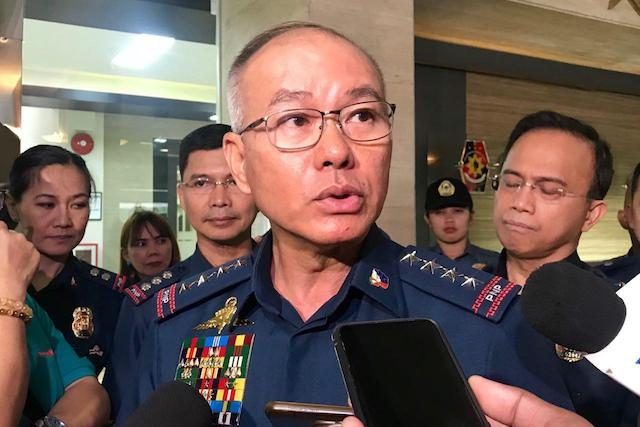SUMMARY
This is AI generated summarization, which may have errors. For context, always refer to the full article.

MANILA, Philippines – The academe is not the Supreme Court.
Philippine National Police (PNP) chief General Oscar Albayalde had this to say when asked to comment on the conclusion of legal academics and researchers that circulars that operationalize the government’s so-called anti-drug campaign violate constitutionally guaranteed rights.
“They are not the proper body or authority to say that it is constitutional or not. Hindi po sila. Hindi po sila ang Supreme Court (It is not them. They are not the Supreme Court),” Albayalde said.
He was reacting to a paper by the Ateneo Human Rights Center (AHRC), which concluded that circulars of President Rodrigo Duterte’s drug war violate the rights of suspects guaranteed in the Constitution.
Those allegedly violated include right to privacy, information, due process, presumption of innocence, and rights against illegal search, and self-incrimination.
The PNP, however, is not convinced with the arguments of the researchers. Albayalde repeated their argument before the Supreme Court: It’s all voluntary.
“That is voluntary in nature. Remember that TokHang is voluntary. There is no force used here,” Albayalde said.
In PNP briefing, top cop Oscar Albayalde says they are "open to suggestions" in the drug war, after the recent gathering of legal academics and researchers questioning the legal framework of the war on drugs. @rapplerdotcom pic.twitter.com/FUFiegTYi8
— Rambo Talabong (@rambotalabong) April 29, 2019
Police to invite academics
There have been cases documented, however, showing that cops abused their authority and possibly applied unnecessary force in arresting drug suspects. There are also allegations being that the police planted illegal drugs and guns on suspects who were believed to have been innocent. (READ: The Impunity Series)
Most of these questioned cases happened during the first months of the Duterte administration and in Metro Manila. At that time, Albayalde was the top cop of the region, answering to his classmate former police chief Ronald dela Rosa.
Nonetheless, Albayalde said, the police are ready to speak with the researchers to accept recommendations on how to reform the anti-drug campaign. Asked why they are opening up only now when they were previously invited to various research presentations on the drug war, Albayade said organizers did not allow the cops to speak in these events.
“Sila-sila lang on the presentation, parang audience lang kami, and kung ano ipresent, kung ano gusto nila itake na lang namin, tanggapin na lang namin. Parang one-way siya (It’s just them presenting, we are only the audience, and what they present they want us to accept it immediately. It’s one-way),” Albayalde said.
Albayalde has directed their Directorate for Operations and Directorate for Police and Community Relations to invite academics “for a discussion to further improve” the anti-drug campaign—an invitation that will only come after almost 3 years since the start of questioned anti-drug campaign began. – Rappler.com
Add a comment
How does this make you feel?
There are no comments yet. Add your comment to start the conversation.